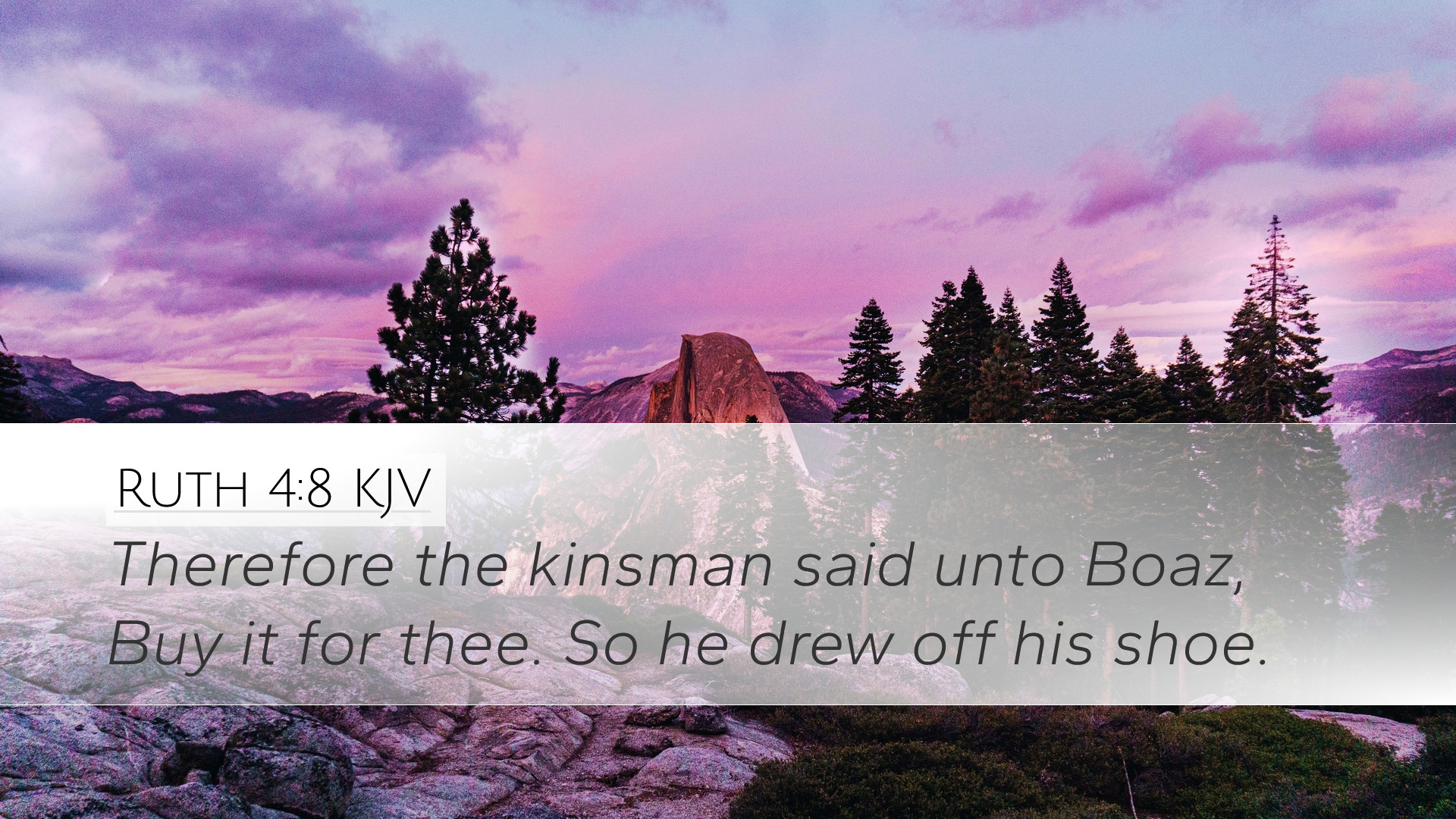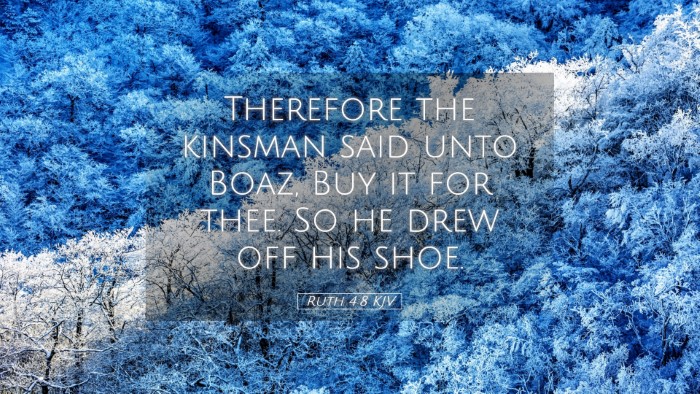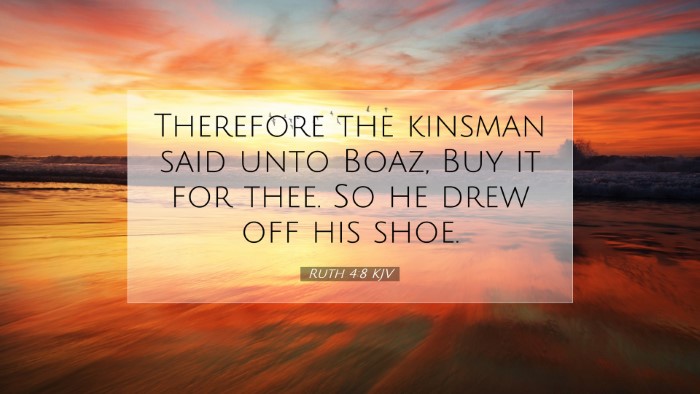Old Testament
Genesis Exodus Leviticus Numbers Deuteronomy Joshua Judges Ruth 1 Samuel 2 Samuel 1 Kings 2 Kings 1 Chronicles 2 Chronicles Ezra Nehemiah Esther Job Psalms Proverbs Ecclesiastes Song of Solomon Isaiah Jeremiah Lamentations Ezekiel Daniel Hosea Joel Amos Obadiah Jonah Micah Nahum Habakkuk Zephaniah Haggai Zechariah MalachiRuth 4:8
Ruth 4:8 KJV
Therefore the kinsman said unto Boaz, Buy it for thee. So he drew off his shoe.
Ruth 4:8 Bible Commentary
Commentary on Ruth 4:8
The verse Ruth 4:8 reads: "So the nearer kinsman said unto Boaz, Buy it for thee. So he drew off his shoe." This brief but significant action carries deep implications within the context of Israelite customs, legal obligations, and redemptive narrative.
Introduction
The Book of Ruth is a profound narrative not just about personal redemption and loyalty but also about the sovereignty of God working through the complexities of human relationships. In the sphere of biblical interpretation, Ruth 4:8 serves as a critical turning point in the unfolding drama of redemption that illustrates the law of the kinsman-redeemer.
Historical Context
Understanding Ruth 4:8 requires an appreciation of ancient Israelite customs concerning property and family lineage. According to the Law, a kinsman-redeemer (Hebrew: goel) had the responsibility to redeem the property of a family member who had fallen into poverty or sold their inheritance (Leviticus 25:25). This represented not only a legal obligation but also a deep familial duty that was intertwined with the spiritual ethos of the community.
Analysis of the Verse
In this verse, we observe a transaction that is both legal and symbolic. The nearest kinsman, when faced with the opportunity to marry Ruth and thereby redeem Elimelech's lineage, initially expresses willingness but quickly retracts upon realizing the personal implications of the commitment involved.
- Decision-Making in Kinship: The nearer kinsman or redeemer, faced with the choice between his inheritances and familial obligation, opts for self-interest. This decision underscores the theme of choice throughout Scripture, illuminating the personal cost of discipleship and duty.
- Significance of the Shoe: The act of drawing off his shoe is particularly meaningful. In ancient Israel, giving one's shoe signified the relinquishing of rights and property. In this case, it represents the passing of boaz' opportunity to redeem both the land and Ruth.
Theological Insights
The actions depicted in Ruth 4:8 encompass broader theological themes of redemption and covenant faithfulness:
- The Nature of True Redemption: Boaz, unlike the nearer kinsman, embodies the true nature of a redeemer, willing to embrace obligation for the sake of love and community restoration.
- Foreshadowing of Christ: This event can be seen as a typological foreshadowing of Christ, who takes upon himself the burden of redeeming humanity, demonstrating the depth of God's commitment to His covenants.
- Cost of Discipleship: The scripture illuminates the cost associated with discipleship—sometimes, the call to follow God may require significant personal sacrifice for the sake of others.
Comparative Commentaries
Insights from prominent public domain commentaries elucidate various aspects of this verse:
- Matthew Henry: In his commentary, Henry emphasizes the moral implications of the kinsman’s decision, framing it within the ethical duty of love over law and highlighting the selflessness of Boaz.
- Albert Barnes: Barnes interprets the legal transaction as one of great significance, especially considering the importance of family loyalty and the concept of redemption in ancient Israel. He draws attention to how the exchange of the shoe underscored the solemnity of the covenant.
- Adam Clarke: Clarke offers a detailed examination of the cultural practices of the time, discussing how the removal of the shoe was a recognized sign of relinquishing rights and how this action carries significant weight in understanding the legal and social obligations of a kinsman-redeemer.
Conclusion
Ruth 4:8 serves as a powerful reminder of the dynamics of choice, obligation, and the far-reaching implications of our decisions. It invites pastors, students, theologians, and Bible scholars to reflect on the themes of redemption and the transformative power within the commitments we make to one another. As believers navigate similar decisions within their faith journeys, the lessons from Ruth and Boaz resonate profoundly, encouraging a commitment to love, sacrifice, and covenant fidelity.


